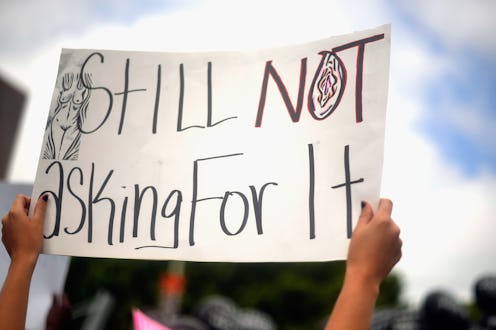Life
Why I Can’t Get Behind The #MeToo Movement, As A Sexual Assault Survivor

When I was in college, I was sexually assaulted. Not once, but several times, in different ways. I felt violated, but told my friends about my assaults lightheartedly; we made jokes, shared our stories, called the assaulters "jerks," and moved on. It was just another moment in a long line of experiences where a man believed he had a right to our bodies — anyone’s bodies.
Back then, we didn’t know how to talk about these things. We didn’t have the words. But when the #MeToo hashtag began to surface on social media over the last few days, offering a platform for women to share their stories about being sexually harassed or assaulted in order to show how common it truly is, it didn’t quite sit right with me. It took some time to sort through what I found so problematic about this “movement,” and it wasn’t the hashtag itself, or the women supporting it. Women are absolutely being empowered by the hashtag; I know that it’s helping them find courage and community, helping to put words to feelings that were until now ineffable. I believe you. I stand with you. I am you, too.
But I came to realize that as a survivor, I don't feel represented by the #MeToo movement. I can't get behind it as a catalyst for change in rape culture. And here are a few reasons why.
Its premise is that sexual harassment and assault happen out of ignorance.
According to the original instructions for the tweet, which were shared by actor Alyssa Milano on Sunday night, sharing the hashtag will help people recognize “the magnitude of the problem,” according to the attachment on Milano's tweet. Oh, if only men knew how widespread the issue is! In 2017, do we really believe that men "just don’t know"? Yes, women are participating in this movement for other, empowering reasons, but the ultimate aim seems, to me, to spread awareness about how widespread rape culture really is. At this point, if a person isn't aware of rape culture, it’s because they don’t want to be. A catchy hashtag created and spread by women won’t change that.
It’s been done before
When the hashtag surfaced, I thought to myself, Are we doing this again? #YesAllWomen and #BeenRapedNeverReported happened and people still need convincing? Survivors have been speaking out about their experiences for a long time. What I need now, as a survivor, is for people to believe me and other survivors. What we need is for people — men, especially — not to laugh it off.
It precludes a conversation about rape culture
Why should I relive and publicize my trauma to convince people that it happens all the time? One woman’s victimization should be enough for us to say, enough is enough.
Sexual harassment and assault are more than isolated incidents perpetrated by bad people. It's a systemic issue where the failure to punish people who commit assault feeds a culture of male entitlement and violence. The people who need to take action are the ones with the power and privilege to do so without risk: in this case, men.
It places the responsibility of fixing rape culture on the victims
In general, I strongly dislike the idea of requiring marginalized people to be the ones to fight and to educate people in positions of power. The concept behind the hashtag puts the onus on victims of sexual harassment and assault to fight for change in a system where we are disadvantaged in doing so in the first place.
Why don’t men start writing about the times when they dismissed, ignored, or perpetrated sexual harassment and abuse? Or pressured a woman to have sex? Or even just a time they mansplained something to a woman, or took credit for her ideas? Maybe then we start getting closer to the root of the problem.
It creates a false sense of solidarity
These are the kinds of campaigns that fair-weather feminists love. They post a status, join a rally, and pat themselves on the back for a job well done. It’s also the kind of campaign where I don’t feel represented — not only did it take the tweet of a white actress for people to start paying attention (#MeToo was actually started by Tarana Burke, a Black woman, ten years ago), the discussions that will ensue are sure to disregard the various ways intersecting identities and marginalization impact the incidences of sexual violence and willingness to report.
It pressures people to speak
Few things are as discomfiting as a status that reads "I didn’t want to do this but…" No one should feel pressured to disclose personal trauma before they’re ready. If you feel like being open about your experience will help you heal, that’s great. But making it seem like sharing a Facebook or Twitter status is going change our rape culture, or leading people to believe that they are part of the problem by not participating, is manipulative.
Anyone who is surprised by the number of people saying #MeToo has had their eyes and ears closed to what’s been going on. I understand how this viral hashtag can be empowering for some, but for me this is yet another “movement” that pushes survivors to be the drivers of change and educators for men. Men who will inevitably get credit for doing what they always do: the bare minimum.
If you or someone you know has been sexually assaulted, call the National Sexual Assault Telephone Hotline at 800-656-HOPE (4673) or visit online.rainn.org.